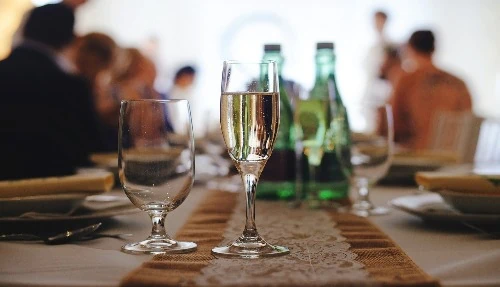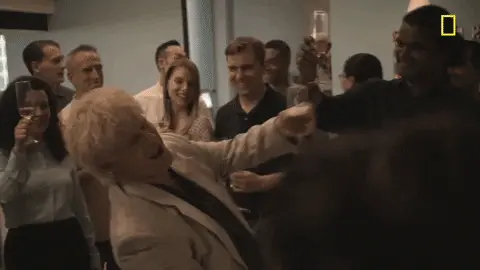Last Updated: April 14, 2024
Hosted a party, and now you don’t know what to do with all the champagne that’s left lying around?
One thing we’re sure of is that the moment you don’t take care of them, they’ll definitely go bad.
But the thing is…
Does champagne go bad at all? Well, it depends on the situation.
So, how long does champagne last? And does champagne age well? Let’s take all of your questions one by one, keep reading, and we promise to answer them all.

The Types Of Champagne
Before actually taking any steps, let’s tackle the basics so you will know which solution would work best for your situation.
Aside from knowing whether your drink is from Dom Pérignon, Veuve Clicquot, Pol Roger, or some other famous brand, you also need to know what type your drink is.
Vintage
Vintage champagnes are the most prominent ones in the market.
When we talk about vintage champagnes, we mean those that were made of grapes that were all harvested in the same year.
These are generally more expensive than other types since they are of higher quality and are delicately made.
If you’re not sure whether your champagne is vintage or not, all you have to do is pick up the bottle and start looking for the year it was made. This can usually be found on the front label, but if you can’t find one, then that means that it’s non-vintage.
Non-Vintage
On the other hand, non-vintage champagne is made of a combination of grapes that were harvested over numerous years. So they’re pretty much a mixture of ripeness and hints.
Even though they may be cheaper, this does not necessarily mean that they’re not as good. In fact, some people prefer non-vintage champagnes because of the unique flavor they have.
Champagne Through Time
Let’s talk about the real question, does champagne age well?
Unlike a bottle of pinot noir red wine, specialty drinks like champagne and sparkling wine do not get better and tastier throughout the years. However, this does not mean that they expire. Well, at least not to a point where it's toxic, poisonous, and gross.
When a champagne bottle stays for too long, it tends to lose all of its good features.
And by this, we mean that all of its fizzy bubbles will not last because the carbonation is bound to evaporate. The overall quality of this drink will lower the longer you keep it. To add up to that, the flavors of your champagne will start to vanish as well.
It's a challenge, especially for the noobs, to predict how long champagnes last. Other "advanced" drinkers might suggest champagne brut vs extra dry as a good starting point to learn more about sparkling wine longevity.
Champagne’s Shelf Life Depending On Situation
So, how long is champagne good for? That depends on two conditions: if the bottle is either opened or unopened and if you're contemplating on wine cooler vs fridge to store your bottle of champagne! Let’s see:
1. Opened And Refrigerated
Let’s talk about the most common situation first.
What should you expect when you refrigerate a bottle of opened champagne that you enjoyed last night? When properly stored, meaning it’s uncontaminated, away from harmful external elements, and at the proper temperature, champagne would take around five days before going flat.
The bottle being either vintage or non-vintage no longer matters since it’s already opened; just make sure to seal the bottle properly so that the carbonation doesn’t escape.
2. Opened And Unrefrigerated
When refrigerated, you can expect it to stay around for about five days, but if not then you can’t really hope for the same shelf life. Properly stored and sealed open champagne bottles would have a shelf life of three days or less.
This is, of course, relative to the temperature of its surroundings. Heat can ruin any drink; if the bottle is kept in a warm atmosphere, its flavors will soon evaporate, and it’ll lose all its bubbles.
3. Unopened And Unrefrigerated
An unopened bottle may last for years, apparently. This is because they're fully sealed; you can pretty much rest assured that their flavors, bubbles, and hints won't go anywhere.
The question, “how long is unopened champagne good for?”, varies greatly on whether you store it in a cool area or not. If you’re keeping an unopened bottle unrefrigerated, make sure to keep it at room temperature, away from any vibrations, and protected from harmful elements.
If you do it right, you can expect it to remain crisp for about three years!
4. Unopened And Refrigerated
Having a fully sealed bottle in your fridge is the best situation to be in. It’ll be years before that bottle goes bad.
Before we start talking about years, take note that you’ll start counting from the year you’ve purchased the bottle and not from the manufacturing year.
Vintage champagnes will stay around for a minimum of five years, but depending on the quality, it may even last for ten years!
Non-vintage champagnes get stale a little quicker; the fact that it's made of various grapes shortens the shelf life to four years. So, of course, even though it's unopened and refrigerated, its quality is bound to decline over time.
Fun Fact: Wine coolers help in preserving wine and other drinks. There are a variety of models on the market today; however, one stands out and is known for being the best Vinotemp wine cooler unit for the budding wine enthusiast. Why not give this one a try?
Storing Champagne Properly
Aside from knowing how long does champagne last, you should also take note of how to properly store them so that its quality wouldn’t decline any sooner. More importantly, you should know the proper wine fridge temperature so that your champagne wouldn't spoil quickly.
Sealing
Properly sealing your bottles matter more than you think. If the bottle has a screw-on type cover, you may think that you just need to close it tightly or put the cork back as deep as you can, but that’s not always the case.
Here’s where a champagne sealer comes into play.
Putting a cork back may be tricky, and using things like tape or rubber to tightly close the cap just doesn’t work.
Champagne sealers are small devices made of stainless steel that easily attach to your opened bottles. They’ll be the seal or cap of the bottle for the meantime by creating a vacuum and an airtight space.
This device will seal your bottles as tight as possible, meaning to say no bubbles, carbonation, flavor, or fizz will escape the bottle.
Refrigerating
Ensuring a consistent quality would require you to immediately store your champagne in a cool area to maintain a constant temperature.
The best place to store a bottle, whether unopened or not, is a wine fridge, of course. This is because its temperatures are readily set to keep specialty drinks.
If you’re storing the bottle in a wine fridge, make use of the white wine temperature default. Note that “default red wine temps” are harmful to champagne flavors.
Now, since not all of us have a wine fridge, you could also use your refrigerator but not your freezer! A champagne bottle would sit well in an 8-10°C (47-50°F) space, any colder, and it’ll numb your tastebuds.
Never place your bottles on the door of a fridge. Champagne thrives in spaces where it won’t be moved or touched. The fact that you’ll be opening and closing your fridge door every day will surely disturb its bubbles.
Store champagne in the vegetable compartments for safety or on the shelves if you're confident that it’s properly sealed.
Fun Fact: Know the ideal wine storage temperature before purchasing a wine fridge! Not all coolers are manufactured the same; hence, it pays to be attentive to small details like temperature, humidity, and bottle capacity, to name a few.
Storing
If you can’t refrigerate your champagne (due to whatever reason), the best way to go is to store it properly.
The first thing you want to do is make sure that it’s properly sealed. If you are, then it's time for you to find a safe space for it.
Where you will place the bottle is a great factor in keeping the substance crisp and fresh. Store champagne in an area where it can stay for as long as it needs to; these bottles aren’t a big fan of being moved around all the time.
Also, keep them away from appliances that exert heat and produce vibrations. You wouldn’t want your drink to be cooked or stale.
Speaking of cooked champagne, you also want to place them far away from windows or anywhere at all where sunlight can reach. UV rays are harmful to the flavors, and the heat would pretty much just cook it.
If you're very willing to make that bottle of champagne last, you can wrap it in cling wrap for extra protection.
Frequently Asked Questions
Can old champagne make you sick?
No. Although champagnes do expire over time, they won’t give you any harmful side effects compared to other soft and hard drinks. Expired champagne may look, smell, and taste bad, but it’ll never give you any effects like food poisoning, a bad stomach, or any illness at all. Old champagne won’t make you sick unless you drink an unreasonable amount.
Can you drink champagne that is out of date?
Yes, in fact, you can but this does not mean it would taste nice. Old champagne may be stale, tasteless, and dry, but it’ll never be toxic or poisonous.
What can be done to stale or flat champagne?
If a bottle of champagne is no longer good enough to be enjoyed as a drink, then don’t feel bad! You don’t necessarily have to throw it away. You can still whip up cocktails with it as the main ingredient. If that champagne doesn’t give you enough flavor, then other liquors will! You can also freeze it into ice cubes and use them for other cocktails.
Stale champagne can also be used in cooking too -- you won’t need that fizz or strong flavor in your dishes, anyway. Stews, crepes, sauces, and almost any dish can include some champagne in its recipe.
Conclusion
Let’s have a short summary of what we’ve tackled.
Through time, champagne may lose all of its flavors, fizz, and all the other good qualities you love in it; it may get dry, stale, and bitter but, it’s never harmful to drink.
Properly stored champagne (sealed, refrigerated, and uncontaminated) have a shelf life ranging from days up to years, depending on whether it’s opened or not.
Now that you’ve learned all of this, go ahead and pop open a bottle; you’ll know what to do after anyway!
